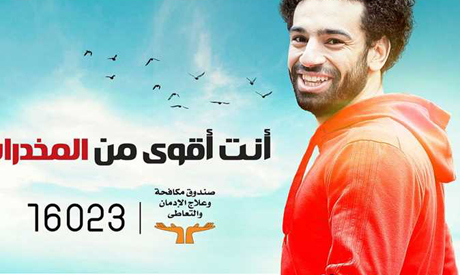
Egypt’s drug campaign featured Mohamed Salah
Egypt’s Fund for Drug Control and Treatment of Addiction (FDCTA), affiliated to the Ministry of Social Solidarity, recently took part in the 63rd session of the United Nations Commission on Narcotic Drugs (CND) which took place in Vienna, Austria, last week. CND is the policymaking body of the UN with prime responsibility in drug related matters.
Executive director of United Nations Office on Drugs and Crime (UNODC) and Egypt’s former minister of social solidarity Ghada Wali inaugurated the event attended by delegations from 133 states, 97 NGOs and 17 international and UN agencies.
The FDCTA is Egypt’s national organisation confronting the problem of addiction. FDCTA held an exhibition on the sidelines of the event, highlighting Egypt’s best practices in countering narcotic drugs addiction. Egypt’s efforts in early prevention, media campaigns, providing treatment according to international standards, and providing rehabilitation, recovery and social reintegration services for drug users and addicts were presented. The exhibition was mainly concerned with Egyptian efforts related to the demand on drugs.
One example of Egypt’s drug efforts is the campaign launched by the country’s most famous football player Mohamed Salah as a role model for Egyptian youth and youth around the world. FDCTA’s also has activities in capacity-building programmes like a post-graduate diploma offered to anyone willing to volunteer in the field. Photographs of these activities were also displayed.
Studies and brochures were handed out to participants. In addition, a documentary produced by the FDCTA about the Egyptian experience in rehabilitation and social inclusion of former drug addicts, entitled Al-Rehla (The trip) was shown. The stars of the film were former drug addicts who also narrated their experiences in the FDCTA rehabilitation centres.
Malak Sayed, 17, an Egyptian student and FDCTA volunteer who participated in the Youth Forum held on the sidelines of the event, related her experience as a volunteer in preventing narcotic drug abuse and raising awareness about its consequences in Egypt.
The activities that Sayed performed as a volunteer with FDCTA included workshops for children at the Cairo International Book Fair that featured drawing and storytelling as well as sessions for adults in schools and universities and to raise awareness about the harms of narcotic drug abuse and to encourage them to either be volunteers or seek help for themselves or for their loved ones via the FDCTA hotline.
“I represented Egypt in the Vienna forum as an active participant in awareness campaigns,” Sayed said, adding that she also learnt from the ideas and experiences of other countries in the field. “I also told the participants about my experience in the FDCTA awareness campaigns during my presentation at the end of the event… People there really liked the Mohamed Salah campaign.:
According to a UN 2020 report by the secretariat, issued during the event, between 2009 and 2017, the estimated number of past-year users of any drug globally rose by around 30 per cent from 210 million to 271 million. Data show a higher prevalence over time of the use of opioids in Africa, Asia, Europe and North America, and of the use of cannabis in North America, South America, and Asia.
Information on the extent of drug use in Africa remains limited, and is available from only a few countries. Many countries in the region, in particular in West, Central and North Africa, report high levels of non-medical use of tramadol, the report said.
The report recommended that countries should use early warning systems like developing guidelines on pain management, raising peoples’ awareness on the potential harms and consequences of misusing pharmaceutical opioids, and holding prescription monitoring programmes.
According to the report, there should be more accessibility, availability, coverage and quality of interventions for the prevention and treatment of drug use disorders especially for at-risk groups in line with the UNODC/WHO International Standards on Drug Use Prevention and the International Standards for the Treatment of Drug Use Disorders.
*A version of this article appears in print in the 12 March, 2020 edition of Al-Ahram Weekly
Short link: